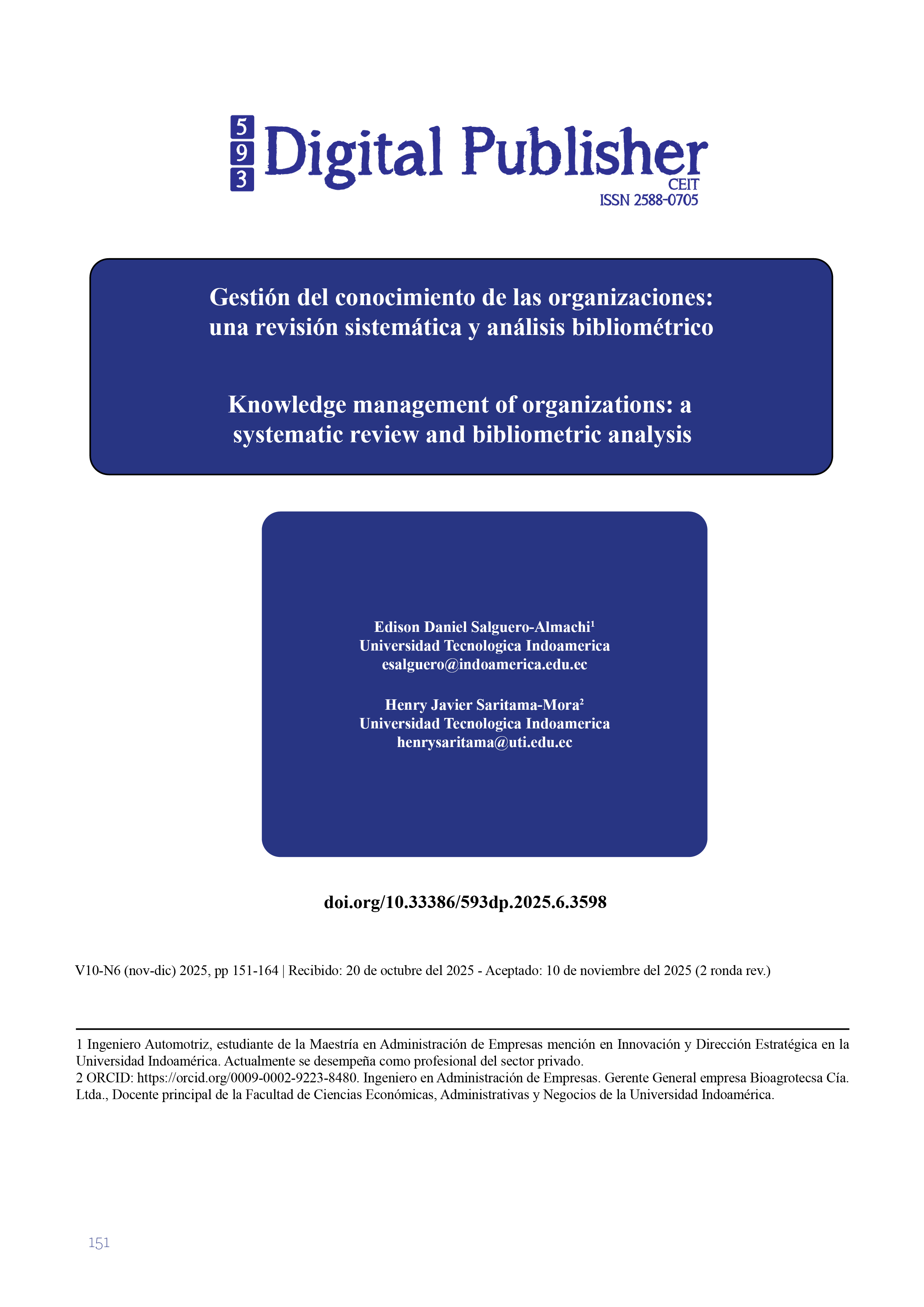Knowledge management of organizations: a systematic review and bibliometric analysis
Main Article Content
Abstract
Organizational Knowledge Management (OKM) has consolidated as a strategic field essential for fostering innovation, competitiveness, and business sustainability. However, the scientific literature continues to show conceptual and methodological fragmentation, limiting the theoretical consolidation of the discipline, particularly within the accelerated context of digital transformation and the integration of emerging technologies such as artificial intelligence. In response to this dispersion, it becomes necessary to adopt a systematic perspective that synthesizes the evolution and intellectual dynamics of research on OKM.
The objective of this study is to analyze the trajectory, scientific structure, and emerging trends related to OKM through a systematic review and bibliometric analysis of academic production published between 1985 and 2025. The PRISMA 2020 protocol was applied for the identification and selection of records in the Scopus database, resulting in a final corpus of 664 articles. Data were processed using the Bibliometrix package in R, allowing the examination of productivity and impact indicators, collaboration networks, and thematic mapping.
The results reveal sustained growth in scientific production, a core of specialized journals led by the Journal of Knowledge Management, and three consolidated thematic clusters: innovation and organizational learning, technology adoption, and knowledge sharing and performance. Gaps are identified in integrating OKM with sustainability and small and medium-sized enterprises, suggesting future research directions toward the convergence of knowledge and technology.
Downloads
Article Details

This work is licensed under a Creative Commons Attribution-NonCommercial-ShareAlike 4.0 International License.
1. Derechos de autor
Las obras que se publican en 593 Digital Publisher CEIT están sujetas a los siguientes términos:
1.1. 593 Digital Publisher CEIT, conserva los derechos patrimoniales (copyright) de las obras publicadas, favorece y permite la reutilización de las mismas bajo la licencia Licencia Creative Commons 4.0 de Reconocimiento-NoComercial-CompartirIgual 4.0, por lo cual se pueden copiar, usar, difundir, transmitir y exponer públicamente, siempre que:
1.1.a. Se cite la autoría y fuente original de su publicación (revista, editorial, URL).
1.1.b. No se usen para fines comerciales u onerosos.
1.1.c. Se mencione la existencia y especificaciones de esta licencia de uso.
References
Abbas, J., & Kumari, K. (2021). Examining the impact of knowledge management on organizational performance: A systematic review. Recuperado de https://doi.org/10.1108/JKM-10-2020-0759
Ardito, L., Rizzo, F., & Messeni Petruzzelli, L. (2022). Mapping knowledge management research: A bibliometric analysis. Technological Forecasting and Social Change, 175.
Aria, M., & Cuccurullo, C. (11 de 2017). bibliometrix : una herramienta R para el análisis exhaustivo de mapas científicos. Recuperado de https://www.sciencedirect.com/science/article/abs/pii/S1751157717300500?via%3Dihub
Bettiol, M., De Marchi, V., & Di Maria, E. (19 de 12 de 2017). Developing capabilities in new ventures: a knowledge management approach. Recuperado de https://www.tandfonline.com/doi/full/10.1057/kmrp.2015.16
Cerchione, R., & Esposito, E. (12 de 2016). A systematic review of supply chain knowledge management research: State of the art and research opportunities. Recuperado de https://www.sciencedirect.com/science/article/abs/pii/S0925527316302365?via%3Dihub
Del Giudice, M., Scuotto, V., Papa, A., & Tarba, S. (2022). Knowledge management and digital transformation: Mapping the research landscape. Journal of Business Research, 139.
Diaz Tautiva, J., Rifo Rivera, F. I., Barros Celume, S. A., & Rifo Rivera , S. A. (06 de 10 de 2022). Mapping the research about organisations in the latin american context: a bibliometric analysis. Recuperado de https://link.springer.com/article/10.1007/s11301-022-00296-3
Donthu, N., Kumar, S., Mukherjee, D., Pandey, N., & Lim, W. M. (9 de 2021). How to conduct a bibliometric analysis: An overview and guidelines. Recuperado de https://www.sciencedirect.com/science/article/pii/S0148296321003155?via%3Dihub
Idrees, H., Xu, J., Haider, S. A., & Tehseen, S. (6 de 2023). A systematic review of knowledge management and new product development projects: Trends, issues, and challenges. Recuperado de https://www.elsevier.es/en-revista-journal-innovation-knowledge-376-articulo-a-systematic-review-knowledge-management-S2444569X2300046X
Landroguez, S. M., & Carrión , G. C. (24 de 11 de 2016). How knowledge management processes can create and capture value for firms? Recuperado de https://link.springer.com/article/10.1057/kmrp.2015.26
Liao, S.-h. (8 de 2023). Knowledge management technologies and applications—literature review from 1995 to 2002. Recuperado de https://www.sciencedirect.com/science/article/abs/pii/S0957417403000435
López Urbina, J., & Sánchez Dávila, K. (22 de 2 de 2025). Knowledge management in Latin America: Analysis of research trends from Scopus. Recuperado de https://ijsmc.pro-metrics.org/index.php/i/article/view/163
Marulanda Grisales, N., Herrera Pulgarín, J. J., & Urrego Marín, M. L. (30 de 01 de 2024). Knowledge Management Practices as an Opportunity for the Achievement of Sustainable Development in Social Enterprises of Medellín (Colombia). Recuperado de https://www.mdpi.com/2071-1050/16/3/1170
Muñoz, P., Curado, & Galende. (2023). Knowledge management and innovation: A systematic review and research agenda. Journal of Knowledge Management, 35-58.
Naeem, M. (05 de 06 de 2019). Uncovering the role of social media and cross-platform applications as tools for knowledge sharing. Recuperado de https://www.emerald.com/vjikms/article-abstract/49/3/257/382722/Uncovering-the-role-of-social-media-and-cross?redirectedFrom=fulltext
Ochoa Jiménez, S., Leyva Osuna, B. A., Jacobo Hernández, C. A., & García García, A. R. (14 de 12 de 2021). Knowledge Management in Relation to Innovation and Its Effect on the Sustainability of Mexican Tourism Companies. Recuperado de https://www.mdpi.com/2071-1050/13/24/13790
ONU. (25 de 9 de 2015). Objetivos de desarrollo sostenible. Recuperado de https://www.un.org/sustainabledevelopment/es/objetivos-de-desarrollo-sostenible/
Page, M., McKenzie, J., & Bossuyt, P. (9 de 2021). The PRISMA 2020 statement: an updated guideline for reporting systematic reviews. Recuperado de https://www.sciencedirect.com/science/article/pii/S0300893221002748
Rodriguez Alegre, L. R., Calderón De Los Ríos, H., Hurtado Zamora, M. M., & Ocaña Rodríguez, Á. W. (15 de 08 de 2023). Inteligencia artificial en la gestión organizacional: Impacto y realidad latinoamericana. Recuperado de https://fundacionkoinonia.com.ve/ojs/index.php/revistakoinonia/article/view/2782
Scuotto , V., Nespoli, C., Tran, P. T., & Cappiello, G. (2 de 2022). An alternative way to predict knowledge hiding: The lens of transformational leadership. Recuperado de https://www.sciencedirect.com/science/article/abs/pii/S0148296321008523?via%3Dihub
Zhao, L., Pan, X., & Chen, H. (2024). Artificial intelligence, knowledge management, and sustainable organizational performance: A systematic review. Journal of Business Research, 170.



